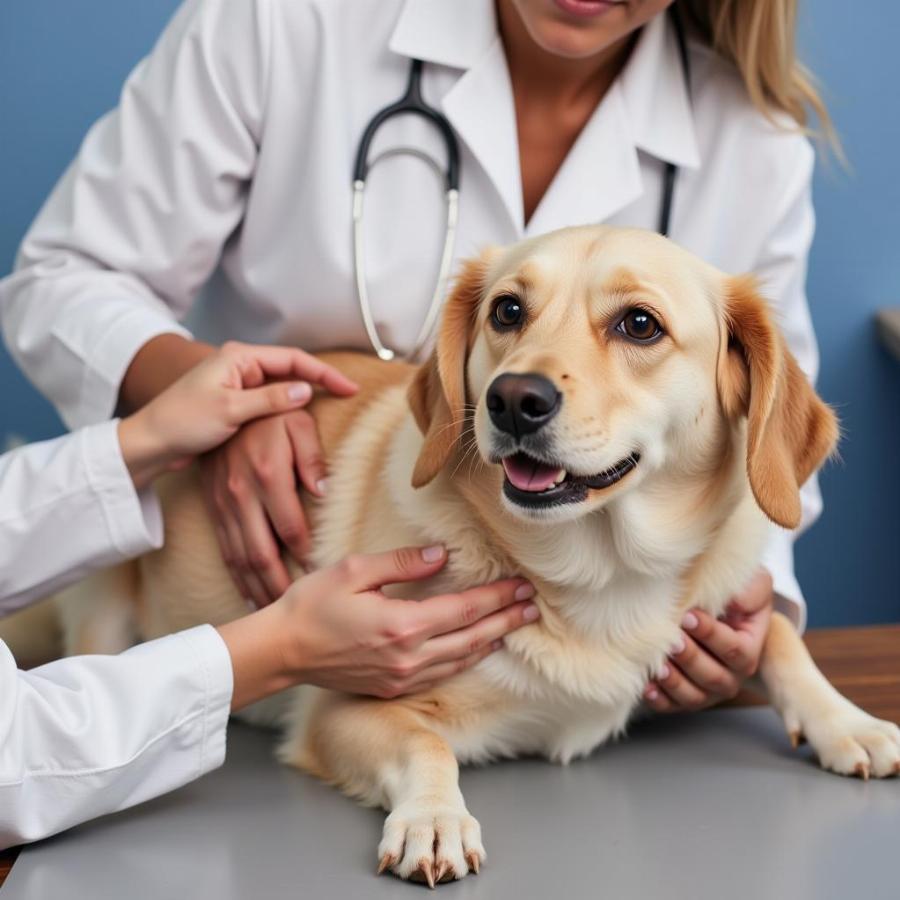Dog diarrhea is a common concern for pet owners. Understanding the causes for dog diarrhea is crucial for effective treatment and prevention. While a bout of loose stools might be nothing serious, persistent diarrhea can signal an underlying health issue. This comprehensive guide will delve into the various causes of diarrhea in dogs, helping you identify potential triggers and seek appropriate veterinary care when necessary.
Why is My Dog Having Diarrhea? Understanding the Causes
Many factors can contribute to dog diarrhea, ranging from dietary indiscretions to serious medical conditions. Figuring out the root cause is key to providing the right care. Is it something they ate? A parasite? Or could it be something more concerning? Let’s explore some common culprits.
Dietary Indiscretions: The Usual Suspect
One of the most frequent causes for dog diarrhea is simply eating something they shouldn’t. This could include scavenging in the trash, snatching a forbidden treat off the counter, or even overindulging in their regular food. Changes in diet, such as switching to a new brand of dog food, can also upset their digestive system.
Infections: Bacterial, Viral, and Parasitic
Infections are another significant cause of dog diarrhea. Bacteria like Salmonella and E. coli can cause gastrointestinal distress. Viral infections, such as parvovirus, can also lead to severe diarrhea, especially in puppies. Parasites like roundworms, hookworms, and Giardia can also irritate the intestinal lining and result in diarrhea.
Food Allergies and Intolerances: Not Always Obvious
Just like humans, dogs can develop allergies or intolerances to certain ingredients in their food. Common culprits include beef, chicken, dairy, and wheat. Identifying food allergies can be challenging, and often requires an elimination diet under the guidance of a veterinarian.
What Causes Diarrhea in Dogs? Beyond the Basics
Beyond the common culprits, several other factors can contribute to dog diarrhea. These can range from relatively benign to more serious conditions requiring immediate veterinary attention.
Stress and Anxiety: The Hidden Culprit
Believe it or not, stress and anxiety can manifest physically in dogs, often leading to digestive upset and diarrhea. Changes in routine, travel, new environments, or even loud noises can trigger stress-induced diarrhea.
Medications: An Unintended Side Effect
Certain medications, such as antibiotics, can disrupt the delicate balance of gut flora, leading to diarrhea. Always consult your veterinarian about potential side effects before administering any new medication to your dog.
Inflammatory Bowel Disease (IBD): A Chronic Condition
IBD is a chronic condition that causes inflammation in the digestive tract. Symptoms can include persistent diarrhea, vomiting, weight loss, and lethargy. Managing IBD typically involves dietary changes and medication.
 Veterinarian Examining a Dog with Diarrhea
Veterinarian Examining a Dog with Diarrhea
Pancreatitis: A Serious Concern
Pancreatitis, inflammation of the pancreas, can also cause diarrhea, along with vomiting, abdominal pain, and loss of appetite. This condition requires prompt veterinary attention.
When Should I Worry About My Dog’s Diarrhea?
While occasional loose stools might not be cause for alarm, certain signs warrant immediate veterinary attention. These include bloody diarrhea, severe lethargy, vomiting, fever, abdominal pain, or any other signs of distress. If your dog has watery diarrhea, it’s also important to consult a vet, as this can lead to dehydration. Similarly, yellow dog diarrhea can indicate underlying liver or gallbladder issues.
Conclusion
Understanding the causes for dog diarrhea is essential for responsible pet ownership. By recognizing potential triggers and seeking professional guidance when necessary, you can help your furry friend maintain a healthy digestive system and overall well-being. Remember, persistent or severe diarrhea should always be evaluated by a veterinarian.
FAQ: Common Questions about Dog Diarrhea
- What can I give my dog for diarrhea? It’s best to consult your vet before administering any medication. They might recommend a bland diet or specific treatments.
- How long should dog diarrhea last? A mild case might resolve within a day or two, but persistent diarrhea warrants veterinary attention.
- Can I give my dog Imodium for diarrhea? Never give your dog human medications without consulting your vet. Some human medications can be toxic to dogs.
- What is the best food for a dog with diarrhea? A bland diet of boiled chicken and rice is often recommended.
- Is dog diarrhea contagious to humans? Some causes of dog diarrhea, such as certain parasites, can be transmitted to humans. Practice good hygiene.
- How can I prevent my dog from getting diarrhea? Avoid sudden dietary changes, prevent access to garbage, and ensure your dog is up-to-date on vaccinations and parasite prevention.
- What does the color of dog diarrhea mean? Different colors can indicate different underlying issues. For example, yellow dog diarrhea can suggest liver problems.
Related Articles You Might Find Helpful:
Looking for more information on specific types of diarrhea or other related topics? Check out these helpful resources:
- my dog has watery diarrhea
- yellow dog diarrhea
- what causes diarrhea in dogs
- cause of diarrhea in dogs
Beaut Dogs is your trusted source for all things related to dog care, offering expert advice and valuable information on various breeds, health concerns, and training tips. When you need help understanding what causes a dog diarrhea, or any other canine-related question, please contact us at Email: [email protected] for detailed and accurate answers from Beaut Dogs. Visit us at https://beautdogs.com to explore the wonderful world of dogs and learn how to provide the best possible care.